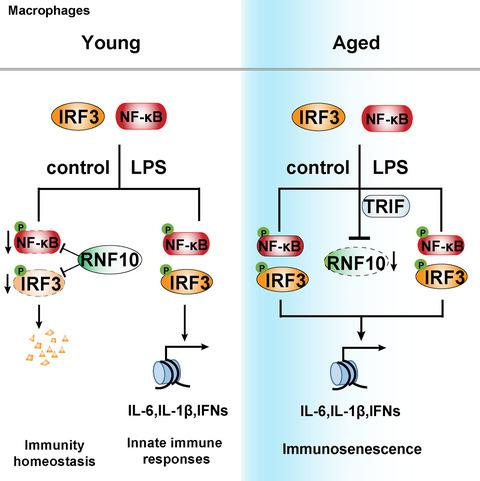当前位置:
X-MOL 学术
›
FEBS Open Bio
›
论文详情
Our official English website, www.x-mol.net, welcomes your
feedback! (Note: you will need to create a separate account there.)
Reduced RING finger protein 10 expression in macrophages is associated with aging‐related inflammation
FEBS Open Bio ( IF 2.8 ) Pub Date : 2020-11-28 , DOI: 10.1002/2211-5463.13049 Xinyuan Cao 1 , Lidan Liu 2 , Yueyi Zhang 1 , Yingyun Yang 1
FEBS Open Bio ( IF 2.8 ) Pub Date : 2020-11-28 , DOI: 10.1002/2211-5463.13049 Xinyuan Cao 1 , Lidan Liu 2 , Yueyi Zhang 1 , Yingyun Yang 1
Affiliation

|
Age‐associated decline of the immune system is referred to as immunosenescence. The E3 ligase RING finger 10 (RNF10) has long been associated with the innate immune response, although a potential role in immunosenescence has not previously been reported. In the present study, we identified that RNF10 expression is lower in aged mouse macrophages than in young cells. After lipopolysaccharide stimulation, RNF10 expression remained at a basal low level in aged mouse cells, but declined sharply in young mouse cells. Knockdown of RNF10 enhanced both the nuclear factor‐κB and interferon regulatory factor 3 signaling pathways and thus enhanced proinflammatory cytokines and type I interferons in macrophages, promoting clearance of Listeria monocytogenes. These findings indicate that dysregulated expression of RNF10 is associated with age‐associated immune dysfunction, and RNF10 may thus be a potential target for the treatment of age‐related inflammatory diseases.
中文翻译:

巨噬细胞中 RING 指蛋白 10 表达降低与衰老相关炎症有关
与年龄相关的免疫系统衰退称为免疫衰老。E3 连接酶 RING finger 10 (RNF10) 长期以来一直与先天免疫反应有关,尽管以前没有报道过它在免疫衰老中的潜在作用。在本研究中,我们发现衰老小鼠巨噬细胞中 RNF10 的表达低于年轻细胞。脂多糖刺激后,RNF10 在老年小鼠细胞中的表达保持在基础低水平,但在年轻小鼠细胞中急剧下降。敲除 RNF10 增强核因子-κB 和干扰素调节因子 3 信号通路,从而增强巨噬细胞中的促炎细胞因子和 I 型干扰素,促进单核细胞增生李斯特菌的清除. 这些发现表明,RNF10的表达失调与年龄相关的免疫功能障碍有关,因此RNF10可能是治疗年龄相关炎症性疾病的潜在靶点。
更新日期:2020-11-28
中文翻译:

巨噬细胞中 RING 指蛋白 10 表达降低与衰老相关炎症有关
与年龄相关的免疫系统衰退称为免疫衰老。E3 连接酶 RING finger 10 (RNF10) 长期以来一直与先天免疫反应有关,尽管以前没有报道过它在免疫衰老中的潜在作用。在本研究中,我们发现衰老小鼠巨噬细胞中 RNF10 的表达低于年轻细胞。脂多糖刺激后,RNF10 在老年小鼠细胞中的表达保持在基础低水平,但在年轻小鼠细胞中急剧下降。敲除 RNF10 增强核因子-κB 和干扰素调节因子 3 信号通路,从而增强巨噬细胞中的促炎细胞因子和 I 型干扰素,促进单核细胞增生李斯特菌的清除. 这些发现表明,RNF10的表达失调与年龄相关的免疫功能障碍有关,因此RNF10可能是治疗年龄相关炎症性疾病的潜在靶点。









































 京公网安备 11010802027423号
京公网安备 11010802027423号